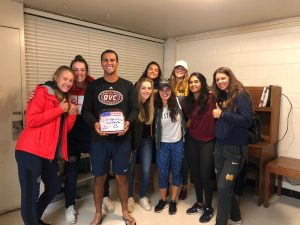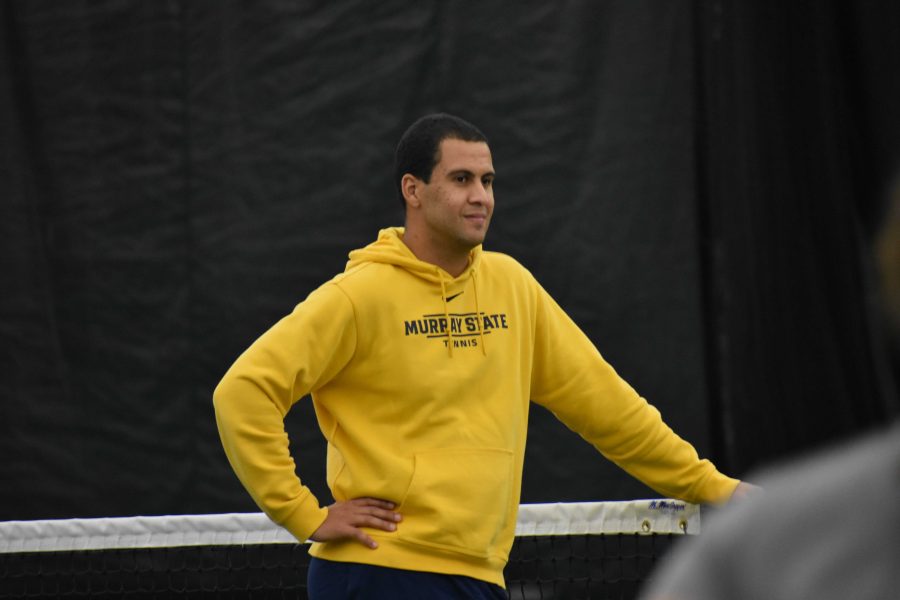Blake Sandlin
Sports Editor
bsandlin1@murraystate.edu
Jorge Caetano had every reason to think the 2017-18 season with the Murray State women’s tennis team was going to be his last.
Caetano, who has served as head coach since 2014, is an international student from Niteroi, Brazil. A former Murray State tennis player himself, Caetano inherited the head coaching position for the women’s team, while he was still in graduate school at Murray State.
Since then, his life has been a balancing act of education and coaching. In order to stay in the States and work under the terms of his student visa, Caetano had to also be a full-time student. So for two and a half years, that’s what he did: worked and studied – until he couldn’t anymore.
While he was still pursuing his master’s degree, Caetano attempted to apply for a work visa (which would allow three years residency) to remain in the country coaching after he finished school. However, that attempt failed, and Caetano decided he would apply again after receiving his degree.
Caetano admits now, part of the problem was how he was applying. He decided to apply for a different visa, this time the O-1 visa, which is reserved for an “individual who possesses extraordinary ability in the sciences, arts, education, business or athletics,” according to the U.S. Citizenship and Immigration Services’ website.
Caetano graduated from Murray State in December 2016 with his MBA. Fortunately, international students are granted the option of applying for a one-year work permit after receiving a degree. Caetano capitalized on that permit, and spent 2017 with the assurance of U.S. residency.
As his one-year work permit was beginning to expire, he applied for another work visa. In the meantime, he continued to coach his team into their spring season despite the tumult in his personal life.
With the spring semester set to begin and still awaiting a response from his last application, Caetano and his team competed in their spring kick-off tournament at Troy University in Troy, Alabama. On the way back from the tournament, they were met with inclement weather that would ultimately close Murray State University for the first week of classes, from Jan. 15 through Jan. 19.

What began as a nuisance for the Brazil native – who is accustomed to average temperatures of high 70s in January – ultimately turned out to be a blessing in disguise.
“I hated the snow,” Caetano said. “But then they cancelled class for the whole first week. On Saturday, we were leaving to play Middle Tennessee, I got the news that my visa had been denied. I was like ‘Holy [crap]. I got denied again.’ I was a little lost; I didn’t know what to do now because I had finished my MBA. What else could I do? Luckily enough, the snow that I hated so much postponed all the due dates one more week. So for you to enroll in a new course, to enroll in class, everything was the next week. When I got the news on Saturday, I still had time to enroll in a new masters and start school again.”
And so began another year of hitting the reset button, a precarious year of coaching and studying in order to be eligible for a student visa. Caetano continued to pursue a work visa all the while, despite receiving his third rejection in 2018.
Caetano blames cultural differences as the reason behind his continued rejection. Although he has certainly accrued his fair share of accomplishments as a player and coach – achieving a No. 1 singles spot as a player, an 8-1 OVC record last year as a coach and a Top-25 recruiting class – his government didn’t understand the magnitude of his accolades.
“My playing background, that’s one thing that the government doesn’t see when they are giving you the visa or not,” Caetano said. “Like if you play Division II or Division III or JUCO and you are an All-American, they are only going to see that ‘Oh, he’s an All-American.’ They don’t see that I played DI tennis, and for me to be an All-American, it’s almost impossible and be at Murray State. But if I played Division II or III, I would have them because the level is much lower. They just don’t see them.”
While all of this was happening in the background, Caetano was stewarding a Division I program in the foreground. Sure, he was enrolled full-time in classes, but you wouldn’t know it. Caetano led his team to a 14-8 season and a trip to the OVC tennis semi-finals – quite the upgrade considering their 7-12 season a year prior.
Throughout all of the success, the thought of being forced to leave the program he loved loomed heavily in his mind and in the minds of his players.
“I never told them all the details or anything, but they knew I was going back to school, and I kind of wanted to explain to them, especially the new ones, because when I recruit them they want me to be their coach,” Caetano said. “We have a really good relationship with all of them; they love being here. They’re always asking me, ‘Coach what about your visa?’ Every week, ‘What about your visa?’ ‘What about your visa?’ I was very positive about it. I’m like that as a coach of my team, so I always try to be like that in my life, too. Like everything’s going to be fine and everything, but you never know until you actually get it.”
Staff in the athletics department knew of the tumultuous few years Caetano had endured, and did their best to keep him encouraged, though all the while knowing they could be searching for a new women’s tennis coach soon.
“It was the elephant in the room,” Interim Athletic Director, Velvet Milkman said. “We didn’t talk about it a lot; we tried to keep it positive, but we knew. We all knew that it was a possibility, so we just continued to work hard and were hoping that we didn’t have to go down that route. Fortunately, we didn’t.”
However, thanks to work from his lawyers, Caetano was able to convince the Brazilian government of the magnitude of his accomplishments. After four applications, eight semesters of graduate school and a whopping 1300 page file, he finally got the news he was looking for.
In October of 2018, Caetano learned his work visa was approved, granting three years residency in the U.S. Now that the burden had finally been lifted, he decided to have some fun with it and play a prank on his team.
“I texted the group and said, ‘You know how much I want to keep coaching you guys and everything, my VISA process has been so tough, but I have some news for you,” Caetano recalled. “‘Unfortunately, you’re stuck with me for the next few years.’ They’re all like, ‘Oh my goodness, coach, don’t do that to me.’

His team even surprised him with a cake they made to celebrate the news.
“It was pretty sweet from them,” Caetano said. “It was pretty cool. I always thought, maybe it’s not going to go. If I can’t coach, I don’t know what I’m going to do.”
As the women’s tennis season is beginning to ramp up, Caetano is still grateful for those in the athletics department that stood by his side, despite all of the bumps in the road that arose along the way.
“I have to thank the University, too, for trying so hard because it could’ve been easier for them to just hire an American so they wouldn’t have to go through all that,” Caetano said. “They trust my work here with the girls. We’ve been doing a pretty good job, and they always wanted to keep trying with me, so it was really, really important. (Former athletic director) Mr. [Allen] Ward was always supporting me, and now Velvet was always helping me through this process.”
Now that he’s settled, Caetano can finally concentrate on what brought him into coaching in the first place: mentoring and developing athletes. Sure, he knows the intricacies of the sport, but his true value lies in his unique ability to relate to the needs of his players, eight of which are international students just like him.
“He knows the game, but his strength is the relationship with his players,” Milkman said. “He is a mentor for them. They respect him, and they play hard for him. It’s been fun to see the look on their faces when they found out that finally, he’s our coach. It weighs on the back of their mind, as well. It’s going to be the best season yet for his team from that aspect so they don’t have that in the back of their mind.”





























































































